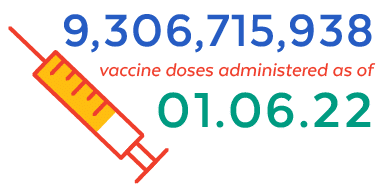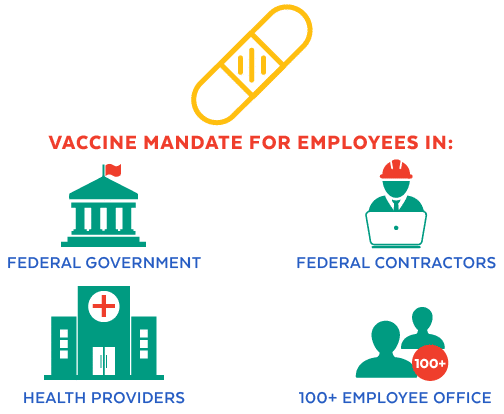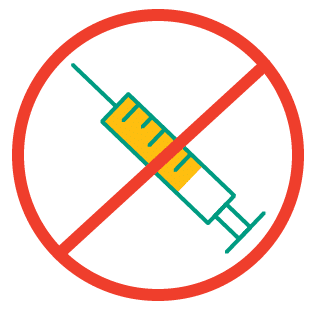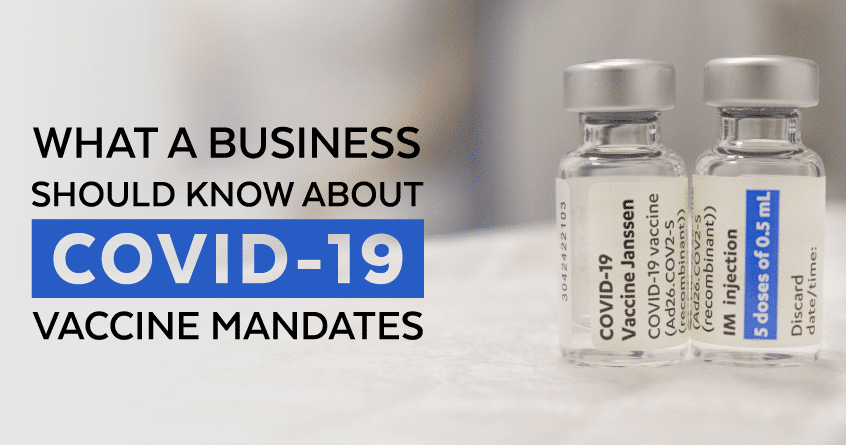After two years, the Coronavirus is still with us. Before we dive into vaccine mandates, here are some facts:
- On December 31, 2019, the Chinese government alerted the World Health Organization (WHO) of a mysterious pneumonia-like disease eventually named COVID-19.
- As of January 6, 2022, there have been 297,848,954 reported cases of COVID-19, with 5,465,472 deaths worldwide.
- The U.S. Food and Drug Administration (FDA) approved the first COVID-19 vaccine on August 23, 2021. Said vaccine was named the Pfizer-BioNTech COVID-19 Vaccine.

- As of January 6, 2022, 9,306,715,938 vaccine doses have been administered.
It is evident this pandemic will be with us for a while more. As a result, many employers are struggling with the difficult decision of whether (or how) to enforce vaccine requirements in their workplace. And vaccines are a hot topic; people are passionate no matter which side of the fence they are on.
We believe that policies around this topic are among the most significant decisions business owners have to make right now. Therefore, we hope that this article will help clarify the issues surrounding vaccine requirements in the workplace.
What are vaccine mandates?
Some city, state, and federal government agencies are turning toward COVID-19 vaccine mandates. This is also true of schools, universities, and various businesses.
But is it legal?
According to WebMD, a vaccine mandate is a “requirement that says you must be vaccinated to do certain things like working, traveling, or even attending a concert.”
Vaccine mandates are common in the U.S. All 50 states require children to have had certain immunizations to start attending school, the most common of which are:
- Diphtheria, Tetanus, and Pertussis
- Polio
- Hepatitis B
- Measles, Mumps, and Rubella
- Varicella (Chickenpox)
In addition, depending on where you travel throughout the world, certain vaccines are required before you leave the U.S. These include:
- Hepatitis A
- Hepatitis B
- Typhoid and paratyphoid fever
- Meningococcal disease
- Rabies
- Japanese Encephalitis
So, yes, vaccine mandates are legal and a well-established custom. But, here’s the thing: The government (or any other authority) cannot force an individual to get vaccinated. The mandate simply means that if a person does not get vaccinated, they can be legally be prohibited from entering a building or using a service.
Are there federal vaccine mandates for COVID-19?
Yes. President Biden recently signed several executive orders (or emergency regulations) that require specific organizations and businesses to mandate vaccines for their employees. It is important to note these mandates require employees to have the vaccination or submit to a weekly COVID test, should they decline. These federal orders specify a vaccine mandate for employees that work in:
- The federal government—including those employed by the armed services
- Federal contractors and subcontractors
- Health providers and any suppliers of Medicare and Medicaid programs
- Any business that has 100 or more employees
 What happens if an employee refuses a vaccine?
What happens if an employee refuses a vaccine?
Employers who encourage or require COVID-19 vaccinations must consider reasonable accommodations for employees who refuse to get vaccinated for medical or religious reasons—unless the accommodation brings undue hardship to the business. In addition, should the business’s employees be covered by a union contract, it may need to negotiate before a mandate is instituted. And, most notably any vaccination mandate should be job-related and consistent with a business necessity.
Religious Accommodations
Title VII of the Civil Rights Act of 1964 requires employers to accommodate an employee’s genuinely held religious belief, practice, or observance—unless they would cause undue hardship to the company. It is important to keep in mind that the definition of “religion” is quite broad.
Labor and employment attorney John Lomax, a partner in the law firm of Snell & Wilner in Phoenix, states:
If an employee refuses to obtain a vaccine, an employer needs to evaluate the risk that objection poses, particularly if an employer is mandating that employees receive a COVID-19 vaccine.
Due to the huge flood of questions regarding religious accommodations for a vaccine mandate, the U.S. Equal Employment Opportunity Commission (EEOC) developed a Religious Accommodation Request Form for employers to use should they choose to. The EEOC has stated:
Although the EEOC’s internal forms typically are not made public, it is included here given the extraordinary circumstances facing employers and employees due to the COVID-19 pandemic. 
Disability Accommodations for Vaccine Mandates
The Americans with Disabilities Act (ADA) states that it is legal for a business to have a policy that expresses that an employee cannot pose a direct threat to the health and safety of other employees in the workplace. However, should a disabled employee opt-out of a vaccine mandate, the employer must be able to show that the unvaccinated worker would constitute such a threat to others.
The EEOC defines a “direct threat” as a “significant risk of substantial harm that can not be eliminated or reduced by reasonable accommodation.”
How can you determine if a “direct threat” exists?
When determining if a direct threat situation exists, ask the following questions:
- Is the threat imminent?
- How likely will there be harm to others?
- What is the nature and severity of the risk?
- What will be the duration of the risk?
Then, ask the following questions:
- What is the employee’s job function?
- How important to the company’s operation is that this employee is vaccinated?
- Is there another job this employee can do to make a vaccine less critical?
The EEOC holds that it is the manager/supervisor’s responsibility to communicate a company’s vaccination policy to all employees. They should know how to recognize and react to a request for accommodation. To help employers follow the law, the EEOC has published the Enforcement Guidance on Reasonable Accommodation and Undue Hardship Under the ADA.
Some Guidance From SHRM
According to Johnny C. Taylor, the president of the Society for Human Resource Management (SHRM-SCP):
If an employee cannot get vaccinated because of a disability or sincerely held religious belief, and there is no reasonable accommodation possible, an employer could exclude the employee from physically entering the workplace. But this doesn’t mean an individual can be automatically terminated. Employers will need to determine if any other rights apply under the EEO laws or other federal, state, and authorities.
Vaccine Directives Are in Chaos
There has been a flurry of appeals to the federal vaccine mandates—all of which are in varying conditions in various Courts of Appeal—with a fight headed to the Supreme Court. In addition, some states are trying to ban vaccine mandates which complicate matters even more, leaving employers scratching their heads and wondering which laws to comply with. In addition, there is the potential situation of employees having general objections to a vaccine mandate that does not legally require an accommodation. In this instance, employers may be put in the untenable position of either sticking to a vaccine mandate policy and terminating non-compliant employees or deviating from the mandate for certain employees, which has a risk of discrimination claims.
Until the courts have settled this issue, companies need to communicate clearly and often with all employees regarding this topic. To do this, try adopting some of the following:
- Lead by example: If you want vaccinated people in your business, make sure all management personnel take the vaccine first.
- Develop and provide a simple, factual vaccination education program for employees.
- Make getting vaccinated as easy as possible: Provide paid time off to get vaccinated as well as any recovery time for potential side effects. Cover all costs associated with getting the vaccine.
- Develop incentive programs to encourage employees to get vaccinated.
Versa Technology, Inc. has been in business since 1994. We deliver last-mile networking solutions that are versatile, user-friendly, and cost-effective to IT professionals worldwide.
We invite you to visit our website.

